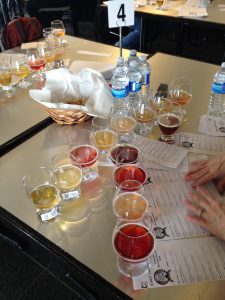Do You Need To Be A Beer Judge To Judge Beer? #BrewedAwakening
Over the next two days I’m helping judge the Down East Brewing Awards, a competition held in advance of the Fredericton Craft Beer Festival, coming up on March 10, 2018. It is different from other competitions I judge, because it does not insist on using BJCP (Beer Judge Certification Program) judges. The panel is a mix of beer folks, with a couple BJCP judges.
I’ve judged a lot of beer in my lifetime. Most of it has been homebrew, since I got really involved in the Canadian Amateur Brewers Association (CABA) in the 90s when I lived in Ontario. I became a Certified Beer Judge via the BJCP and judged regional and national competitions, as well American ones. I also became Competitions Director at CABA, doing a lot of behind the scenes work (i.e. lugging around hundreds of entries!)
After moving back east in 99, I’ve judged less homebrew, but started judging commercial beer. I was one of the small number of judges for the first Canadian Brewing Awards (CBA), the only national competition. They worked us hard that year… Since then I’ve judged that competition numerous times, and have been Judging Director a couple of times. I’ve also judged the ACBA (Atlantic Canadian Beer Awards) most years, and now do the Down East Brewing Awards, which started in 2017.

Samples set up for the CBAs, complete with BJCP scoresheets
Although I’ve been a BJCP judge for 25 years, I’ve always advocated that commercial beer competitions should use a mix of BJCP judges and other judges, including experienced beer writers and brewers. Why? Well, BJCP judges are heavily focussed on defect identification, sticking to style guidelines, and giving feedback to brewers on how to improve their beer. They are really good at this, as are Certified Wine Judges with wine, but they are not generally used for national commercial wine competitions. I judge both national wine competitions, and one uses none of these judges; the other uses just a handful.
Commercial beer (or wine, cider, or spirits) judging is more about overall appeal, including commercial appeal, than it is about finding minor defects and policing adherence to style. We don’t care if a beer entered as a Porter has a bit of roasted barley bitterness, or if a great Pilsner has a little more bitterness or colour than the style guidelines recommend. Is it a great beer? OK, it deserves a medal.
I love judging beer, whether with my BJCP cohorts or with other beer lovers, but it’s no surprise that these panels often pick different medal winning beers.
